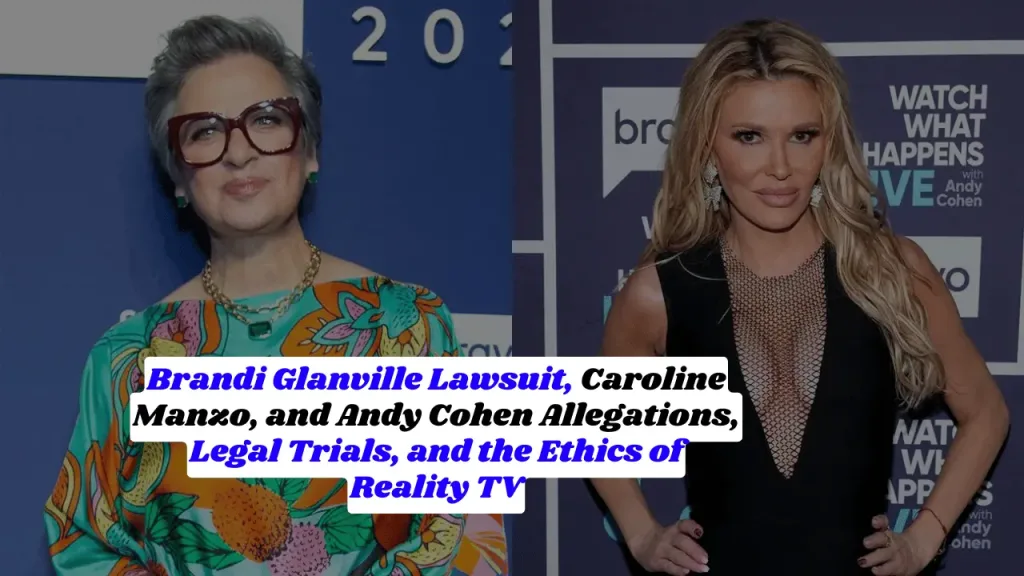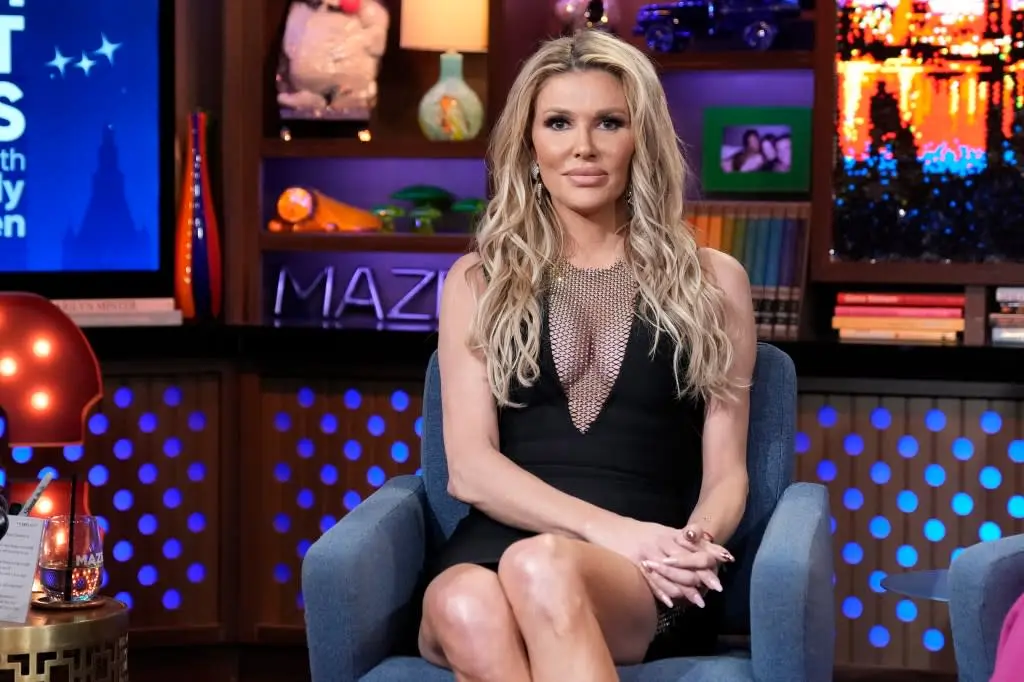Brandi Glanville Lawsuit, Caroline Manzo, and Andy Cohen Allegations, Legal Trials, and the Ethics of Reality TV
The drama of reality television often spills off-screen, and recent allegations involving Brandi Glanville, Caroline Manzo, and Andy Cohen highlight deeper ethical and legal issues within the industry. These cases reveal workplace misconduct, abuse of power, and the vulnerability of reality TV cast members. This article explores the timeline of events, allegations, legal implications, and broader industry practices, with expert insights and references to relevant legal laws.
Table of Contents
Allegations Against Brandi Glanville: What Happened in Morocco?
Caroline Manzo’s Accusations
In January 2023, while filming The Real Housewives Ultimate Girls Trip (RHUGT) in Morocco, Caroline Manzo accused Brandi Glanville of sexual harassment. Manzo claimed Glanville:
- Forcibly kissed her.
- Groped her.
- Pinned her down on a couch.
Manzo described the incident as “traumatic” and subsequently filed a lawsuit in January 2024 against Bravo, NBCUniversal, and Shed Media.
Legal Context
This case potentially breaches the Equality Act 2010 (UK), which prohibits unwanted conduct related to sex in workplace settings, even for freelancers or temporary contractors. Under Section 26 of the Act, harassment includes:
“Unwanted conduct related to a relevant protected characteristic that has the purpose or effect of violating dignity or creating an intimidating, hostile, degrading, humiliating or offensive environment.”
Brandi Glanville’s Denial and Claims of Manipulation
Brandi Glanville, aged 51, denied these allegations, stating that her actions were encouraged by the production team to “make good TV.” In April 2024, Bravo acknowledged that Glanville’s behavior did not warrant disciplinary action. Glanville took to social media, stating:
“I’ve been vindicated by Bravo, and nobody cares!”
Her attorneys also highlighted the industry’s tendency to push boundaries for entertainment, exposing cast members to risky situations without adequate protection.

Brandi Glanville vs. Andy Cohen: Allegations of Sexual Harassment
In February 2024, Glanville’s legal team accused Bravo’s Andy Cohen of sexual harassment. The allegations stemmed from a 2022 incident where Cohen allegedly sent Glanville a video message indicating:
- His intention to sleep with another Bravo star.
- He would be thinking of her during the encounter.
- He invited her to watch via FaceTime.
Glanville’s lawyers described Cohen’s behavior as an abuse of power, likening it to NBC’s Matt Lauer scandal. The letter stated:
“Mr. Cohen was Ms. Glanville’s boss and exercised total control over her career.”
Andy Cohen’s Response
Cohen defended the video as a joke involving Below Deck star Kate Chastain. He posted on Twitter:
“It was absolutely meant in jest, and Brandi’s response clearly communicated she was in on the joke. That said, it was totally inappropriate and I apologize.”
Bravo’s Handling of Allegations and Lawsuits
Response to Caroline Manzo’s Allegations
Bravo maintained that they ensured safety protocols were in place during the Morocco shoot. However, critics argue that production crews often prioritize entertainment value over participant welfare. Legal experts point out potential violations of Health and Safety at Work Act 1974 (UK), which mandates that employers, including production companies, safeguard employee well-being.
Response to Andy Cohen Allegations
NBCUniversal and Bravo have supported Cohen, emphasizing the video’s context as a joke. However, the legal and ethical implications remain concerning, particularly given Cohen’s senior position at Bravo.
Broader Industry Issues: Reality TV Ethics and Legal Rights
Abusive Practices and Contracts
Brandi Glanville’s attorneys, Mark Geragos and Bryan Freedman, highlight systemic issues:
- Cast members face physical and emotional harm.
- Contracts often obscure legal rights.
- Production teams encourage high-risk behavior for ratings.
A 2023 SAG-AFTRA survey found that 41% of reality TV workers reported harassment or coercion during production.
Legal Protections for Reality TV Cast Members
Reality TV participants often lack the same protections as traditional employees. However, UK laws like the Equality Act 2010 and Health and Safety at Work Act 1974 provide grounds for challenging workplace harassment and unsafe conditions.
Key Legal Acts
- Equality Act 2010 (UK) – Protects against workplace harassment.
- Health and Safety at Work Act 1974 (UK) – Mandates safe working environments.
- Title VII of the Civil Rights Act 1964 (US) – Prohibits sexual harassment and discrimination.
Expert Insights on the Reality TV Industry
Mark Geragos on Industry Exploitation
Prominent attorney Mark Geragos stated:
“Thousands of cast members suffer in silence due to the exploitative practices of reality TV.”
Calls for Industry Reform
Legal experts advocate for:
- Clearer Contracts – Ensuring participants understand their rights.
- Mental Health Support – Providing resources for trauma recovery.
- Accountability Mechanisms – Independent bodies to investigate misconduct.
What was Adrienne suing Brandi for?
Adrienne Maloof from The Real Housewives of Beverly Hills was suing Brandi Glanville for defamation. During Season 3, Brandi revealed a personal secret about Adrienne and her family, specifically related to how Adrienne’s children were born via a surrogate. Adrienne claimed that this was a violation of her privacy and considered it defamatory. The lawsuit ultimately led to Adrienne skipping the Season 3 reunion, and she and Brandi never fully reconciled.
Legal Basis:
In the UK or US, defamation claims typically fall under libel (written) or slander (spoken). The Defamation Act 2013 (UK) outlines the requirements for proving harm to reputation.
Related Articles For You:
What Laws Did Minecraft Break? Why Mojang is Facing a Lawsuit from a YouTuber

Who is suing Andy Cohen from Bravo?
While Andy Cohen hasn’t been named as a direct defendant in a lawsuit, Brandi Glanville has accused him of sexual harassment. Her attorneys, Mark Geragos and Bryan Freedman, sent a letter to NBCUniversal, Shed Media, and Warner Bros. detailing her claims against Cohen. This allegation arose after Cohen allegedly sent a video message in 2022 making inappropriate comments. The accusation emerged in the wake of a lawsuit filed by Caroline Manzo against Bravo and its production companies for alleged misconduct during The Real Housewives Ultimate Girls Trip.
What does Brandi Glanville do for money now?
Brandi Glanville continues to earn money through several avenues, including:
- Reality TV Appearances – Brandi frequently returns for various Real Housewives spinoffs and other reality shows like The Traitors and Celebrity Big Brother.
- Podcast Hosting – She hosts her own podcast, Brandi Glanville Unfiltered, where she discusses pop culture, reality TV, and personal experiences.
- Writing – She is a published author of two books:
- Drinking and Tweeting: And Other Brandi Blunders
- Drinking and Dating: P.S. Social Media Is Ruining Romance
- Social Media and Endorsements – She monetizes her social media presence and partners with various brands for endorsements.
What happened between Joanna Krupa and Brandi Glanville?
Brandi Glanville and Joanna Krupa were involved in a defamation lawsuit after Brandi made an inappropriate comment during a 2013 episode of Watch What Happens Live. Brandi claimed that Joanna’s private parts had an unpleasant odor, which Joanna argued was false and damaging to her reputation.
Key Details:
- In 2015, Joanna sued Brandi for slander and emotional distress.
- The lawsuit was settled in 2017. Brandi issued a public apology to Joanna, stating that she regretted the remarks.
This case highlights how public statements by reality TV stars can lead to serious legal consequences.
Legal Context:
In defamation cases, statements that damage a person’s reputation can lead to lawsuits if they are proven false and harmful. In the UK, such claims fall under the Defamation Act 2013.
Conclusion: The Need for Change in Reality TV
The allegations involving Brandi Glanville, Caroline Manzo, and Andy Cohen reflect deeper ethical and legal challenges in the reality TV industry. These cases underscore the need for stronger protections, transparent practices, and a commitment to cast member welfare.
As the industry evolves, balancing entertainment with ethics is crucial. Legal reforms and industry accountability can pave the way for a safer, fairer reality TV environment.
About the Author

Sarah Klein, JD, is a licensed attorney and legal content strategist with over 12 years of experience across civil, criminal, family, and regulatory law. At All About Lawyer, she covers a wide range of legal topics — from high-profile lawsuits and courtroom stories to state traffic laws and everyday legal questions — all with a focus on accuracy, clarity, and public understanding.
Her writing blends real legal insight with plain-English explanations, helping readers stay informed and legally aware.
Read more about Sarah
